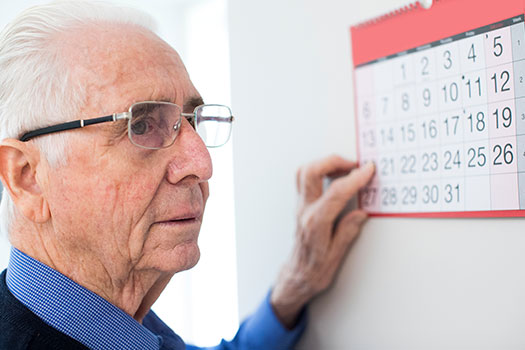The brain is an incredibly complex organ, and researchers still have quite a bit to learn about what causes dementia and other similar mental health disorders. Doctors haven’t discovered a permanent cure for dementia, but seniors who are diagnosed early can often manage the symptoms for years. Here is a look at six early warning signs of dementia that should never be ignored.
1. Short-Term Memory Loss
As dementia slowly begins to damage an individual’s brain, it may be difficult to make new memories. Your loved one might have difficulty recalling the name of someone he or she met a few days before or what he or she had for dinner the previous night. Long-term memories often remain intact for years. Many people who have mild to moderate dementia can still recall memories from decades before.
A dementia diagnosis can be difficult for seniors and their families to face. If you need help caring for your aging loved one while he or she manages the challenges of dementia, turn to Home Care Assistance of Barrie. Dementia care isn’t the only thing we specialize in. All of our hourly and live-in caregivers are also trained to assist seniors during stroke recovery and help those living with Alzheimer’s and Parkinson’s maintain a higher quality of life.
2. Inability to Concentrate
It is perfectly natural for older adults to have difficulty concentrating, but changes to their cognitive health should be gradual. If your loved one has dementia, you will most likely notice a sharp decrease in his or her mental abilities over the course of just a few months. He or she might no longer be able to concentrate on complex tasks such as playing board games or having conversations with multiple people.
3. Difficulty Managing Daily Tasks
Just because your loved one needs help recording a TV show or sending an email doesn’t necessarily mean he or she has dementia. You should only be worried if your loved one suddenly can no longer complete simple tasks that he or she has been doing for years, including paying bills on time, buying groceries, or preparing meals. Seniors who need constant help with basic tasks should schedule a comprehensive memory test and brain scan.
Whether your elderly loved one needs part-time assistance with basic household chores or you need a break from your caregiving duties, the Barrie respite care experts at Home Care Assistance are here to help. All of our respite care services are backed with a 100% satisfaction guarantee, there are no hidden fees in our contracts, and we never ask our clients to sign long-term contracts.
4. Confusing Times, Dates, and Locations
One of the most unusual symptoms of dementia is losing track of time. Certain lobes of the brain help seniors keep track of time, and there may come a point when dementia destroys cells in those areas. Some seniors with dementia feel like they are living years or decades in the past, while others may think they are residing in their childhood homes.
5. Changes in Vocabulary
Depending on the type of dementia, language impairment might be one of the earliest warning signs. Seniors who have mild dementia often mix up words or have a difficult time figuring out what word to use in a specific situation. Others may trail off in the middle of a sentence because they can’t formulate a complete thought. There are many ways to minimize language impairments, including speech therapy, vocabulary exercises, and regular mental stimulation.
6. Poor Judgment
Some of the areas of the brain that retain memories are also used to make complex decisions. When those areas are damaged, seniors might no longer be able to control their words or actions. Some seniors become impulsive, while others withdraw from society. Caregivers who notice these symptoms must speak with a dementia specialist to learn how to manage them.
Caring for a senior loved one with dementia can be a challenging task. Families who need help caring for a senior loved one can turn to Home Care Assistance, a leading provider of Barrie, Ontario, elder care. Services available in our customizable care plans include meal prep, mental and social stimulation, assistance with personal hygiene tasks, and much more. To create a comprehensive in-home care plan for your elderly loved one, call us at 647-970-3803 today.
